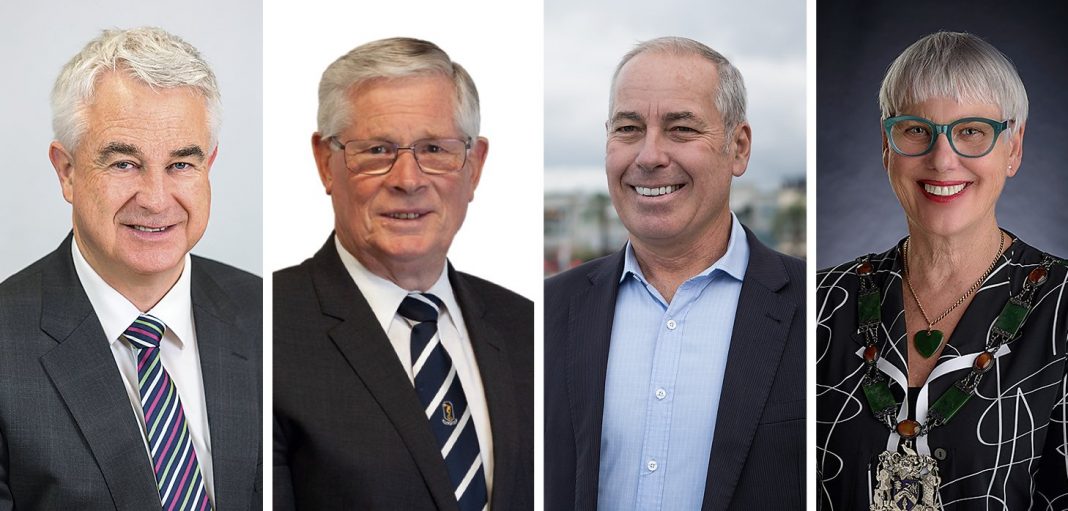Both familiar and new mayoral faces are stepping up in their roles in the wake of the latest round of local body elections in the Bay of Plenty.
While stalwart Western Bay of Plenty mayor Garry Webber retained his seat at the top of the district’s council, and mayor Steve Chadwick in Rotorua retained her seat, Tauranga city is welcoming a new face in Tenby Powell.
Powell seized power from incumbent Greg Brownless by claiming 16,940 votes, a significant 4000-vote lead over Brownless’ 12,286 and Kevin Clout’s 8487.
The vote for Powell came from an election reporting a 40.3 percent turnout – better than in some years, and ahead of the national average for urban centres of 37.8 percent.
Powell’s victory has been described as a “stunning upset” given how well he did in voter support. That came from an electorate clearly in the mood for change as it also kicked out some long-serving councillors including Rick Curach and Bill Grainger.
Brownless was seen to have suffered from reaping the windfall of electoral unhappiness created by a number of issues that he had inherited when he was elected three years ago, rather than had caused, according some observers.
Meantime other longtime candidates who once again failed to get a look in at this election included Murray Guy and Anne Pankhurst.
New council face Andrew Hollis secured a place on council as one of the more high profile candidates who had raised awareness over the condition of State Highway 2 north of the city.
Powell’s push
Powell had campaigned on a platform of making Tauranga a regionally, nationally and globally connected city, aiming to attract younger entrepreneurial innovators to seed more business growth within the city. He said between now and Christmas, his focus would be on building healthier relationships within council.
“This includes ensuring the CEO, who I have a lot of time for, can lead in a way that moves this city forward.”
He said the constant division within the council needed to end, and has had a negative impact rippling through to the city’s social structure.
Powell’s campaign drew strongly on asserting his business experience – especially in the SME sector – and his business and government networks. He also said the city needed to work on building stronger relationships with neighbouring cities.
“I have already been in touch with Hamilton’s new mayor and believe we can work together very effectively,” he said.
“But we also need to work on our relationships with Whakatane, Kawerau and Rotorua,” he said, adding he thought this was something that had been lacking.”
Infrastructure standards were also a key plank of Powell’s campaign, calling for greater focus on unlocking the city’s transport routes in a city he has criticised as “going backwards almost a decade in three years.”
In acknowledging the transport issues of being the country’s fifth largest city on the fourth smallest land mass, Powell has long been a proponent of “up not out” to deal with the region’s growth pressures.
“We simply cannot keep expanding out into valuable orchard land and green space.”
Intensification around Tauranga’s Te Papa peninsula zone along Cameron Road, the city’s most stable geological area, would be a key part of this.
He has also expressed a desire to see Tauranga receive a greater share of the Provincial Growth Fund.
“The last funding we had was $900,000 for a cruise ship terminal and iSite building. We have not received anywhere near our share of those funds.”
Powell comes with a strong business and military pedigree.
He has served in the regular and reserve army since 1983, gaining the rank of colonel and was appointed deputy chief of a UN unit in Middle East from 2005-07.
Awarded a distinguished Alumnus from University of Waikato, and attending Harvard, Powell has held positions in Fletcher Challenge and Skellerup before forming private investment company Hunter Powell Investments in 1999 with wife Sharon Hunter, founder of PC Direct.
Incumbents’ triumph
Western Bay of Plenty District Council incumbent mayor Garry Webber was voted in with 6484 votes, 1319 ahead of his nearest contender Margaret Murray-Benge. The council also has five new council members.
Webber said a key priority in coming weeks was taking a unified regional approach to central government seeking major and urgent investment into the region’s transport infrastructure.
“The regional council, Tauranga city council and ourselves have to stand shoulder to shoulder and approach central government. We are talking days not weeks before this happens.”
He said investment from the Provincial Growth Fund into projects like water bottling and the Kawerau dairy plant would put greater pressure on regional roading, and threatened their viability if the products could not be transported efficiently to port.
Rotorua Lakes District Council standing mayor Steve Chadwick was also re-elected, securing 7796 votes compared with Reynold Macpherson’s 5837.
















